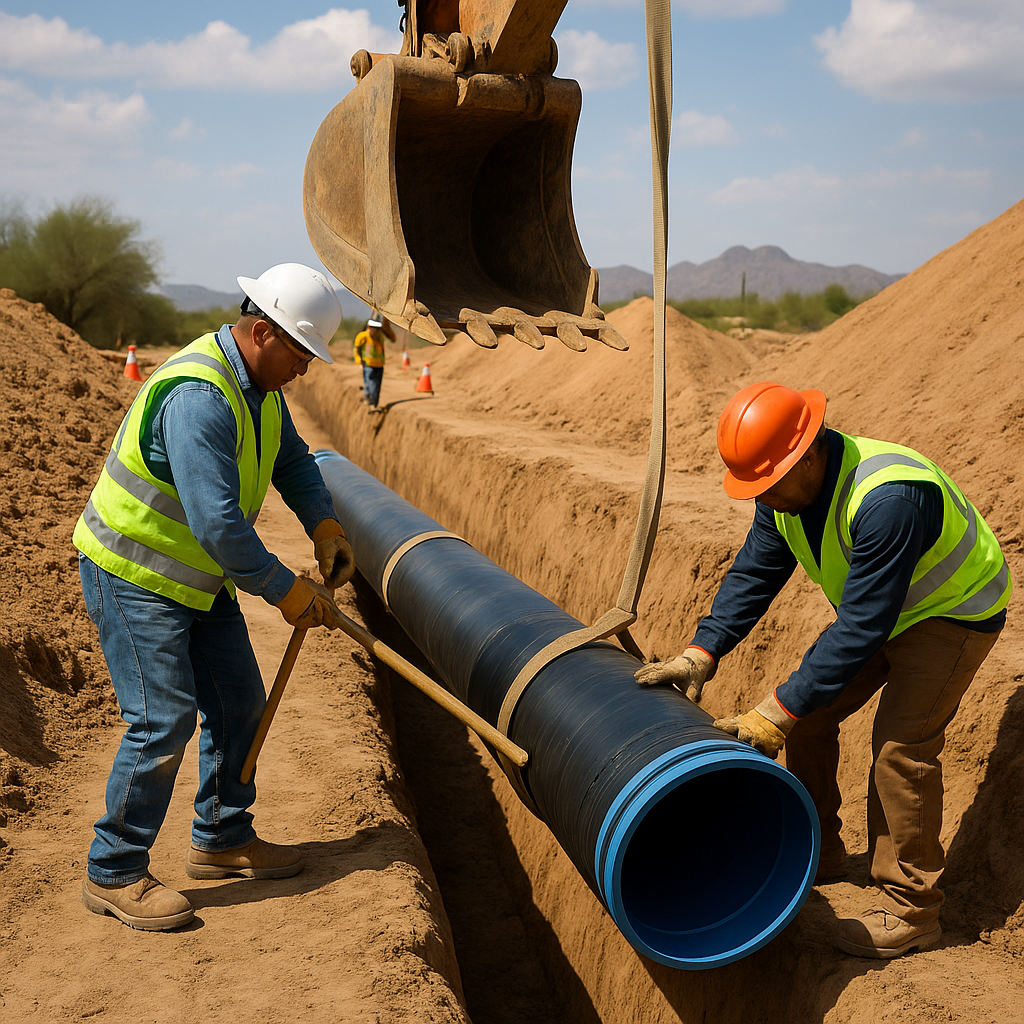 Living in a desert under drought conditions inevitably makes water management a priority for Arizona residents, municipalities and businesses. As Maricopa County continues to see residential and commercial growth, the demand for reliable water and wastewater infrastructure increases. Expansion and growth in the semiconductor industry adds even more pressure to balance supply and use. While water management focuses on policies, conservation strategies and day-to-day operations that help ensure water is used wisely, water system construction focuses on the operational solution — building and upgrading the critical infrastructure that makes water delivery and treatment possible.
Living in a desert under drought conditions inevitably makes water management a priority for Arizona residents, municipalities and businesses. As Maricopa County continues to see residential and commercial growth, the demand for reliable water and wastewater infrastructure increases. Expansion and growth in the semiconductor industry adds even more pressure to balance supply and use. While water management focuses on policies, conservation strategies and day-to-day operations that help ensure water is used wisely, water system construction focuses on the operational solution — building and upgrading the critical infrastructure that makes water delivery and treatment possible.
Water system contractors play a vital role in transforming engineering plans into functional infrastructure that communities depend on. Their work ensures that clean water is delivered reliably, wastewater is safely removed and systems continue to operate efficiently. These contractors partner or work with public utilities, municipalities, private developers and engineering firms to bring designs to life — building the systems that keep water flowing safely and sustainably. A few types of water infrastructure projects are:
- Water distribution systems: installing new pipelines, service connections, valves and hydrants that deliver safe, dependable water service.
- Wastewater systems: building gravity sewers, force mains, manholes and lift stations to transport and manage wastewater effectively.
- Pump stations and booster systems: constructing facilities that maintain water pressure and keep systems operating smoothly.
- Well sites: developing and equipping wells to provide reliable water sources.
- Plant upgrades: modernizing water and wastewater treatment plants with civil work, piping improvements, equipment installations and process piping.
- Site work: completing essential preparation tasks such as excavation, trenching and concrete work to support long-term system durability.
Water Infrastructure Construction Challenges
Construction projects of any kind require coordination and collaboration with multiple parties, which can be challenging. Water infrastructure projects typically involve government entities and representatives, engineers and a construction crew on the ground. Working in a residential community can require coordination with the HOA, the local residents, utility, city officials and, in some cases, the community developer and/or property manager.
Clear communication
One of the major challenges is clear, consistent communication and planning to ensure everyone understands the parameters of a project and the blueprint for a successful implementation and outcome.
Some projects involve private companies spearheading a development or overseeing the management of the water treatment facility upon its completion. Effectively addressing the varied requirements and interests of numerous stakeholders necessitates ongoing strategic and transparent communication. In the case of replacing a community water line, it requires alerting residents living in the community, communicating with the local utility representatives to coordinate the construction plan and making sure there is a thoughtful plan that includes minimum disruption to service.
Time and Weather
Working with municipalities can require permit approvals that often impact the timeline. Another challenge that impacts the schedule is weather. In Arizona, working under extreme heat during summer and early fall is a safety factor for those onsite and can limit when the work can get done.
Investment in the Future
Water infrastructure is an investment in the future and projects must be built to last. Outdated structures or systems operate less efficiently and impact safety and effectiveness. Whether designing and developing a new water or wastewater system, expanding or updating an existing system, or repairing existing pipelines, hiring a skilled and knowledgeable team is imperative. A general contractor knows how to build, but constructing water systems involves more technical knowledge to ensure the design is well-thought-out and the implementation and installation is executed correctly and safely.
 Tim Rockholt is the co-owner of RS Contracting, a Scottsdale-based company that specializes in building and delivering reliable water and wastewater infrastructure systems to communities throughout Arizona. Rockholt is a 25-year veteran in the industry who began working as a laborer on jobsites, learning and working his way up into leadership.
Tim Rockholt is the co-owner of RS Contracting, a Scottsdale-based company that specializes in building and delivering reliable water and wastewater infrastructure systems to communities throughout Arizona. Rockholt is a 25-year veteran in the industry who began working as a laborer on jobsites, learning and working his way up into leadership.











